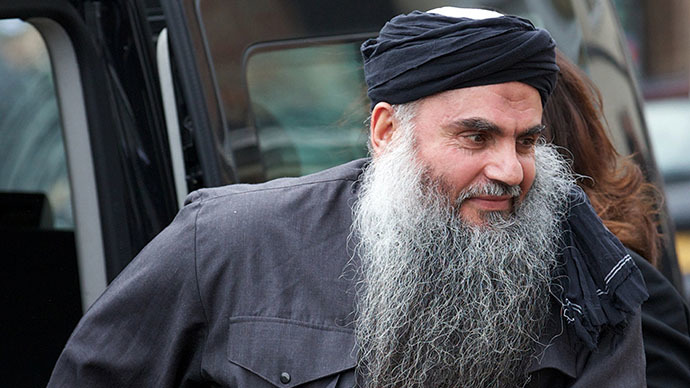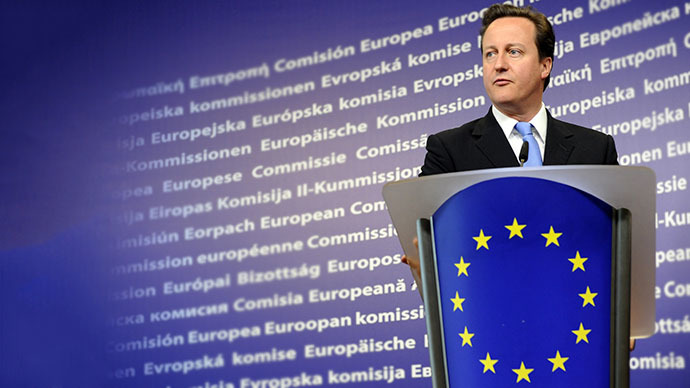Britain could quit the European Convention on Human Rights so it can legally “chuck out” people threatening the country and its way of life, UK PM David Cameron said. Critics doubted Cameron’s honesty, saying such move would mean quitting the EU.
In the first public statement of its kind, the British prime
minister told BBC1 that he was ready to cut ties with the
Strasbourg court, to prevent it from interfering with British
justice.
“I’m less interested in which convention we are signed up to.
As Prime Minister, I want to know I can keep our country
safe,” Cameron said.
When asked if the UK could go as far as to quit the ECHR, Cameron
said: “It may be that that is where we end up.”
He then explained that such a step would enable Britain to
“chuck out” those who are not welcome inside the country.
“Under a Conservative-only government led by me, there will be
the ability to throw out of our country much more rapidly people
who threaten us and our way of life,” Cameron said in a
Sunday interview with BBC1, presumably campaigning for his Tory
party some 20 months before the 2015 UK general election.
According to Cameron, the UK could start by scrapping the Human
Rights Act and replacing it with a homemade Bill of Rights, so
that when cases go to the ECHR there would be “a proper margin
appreciation.” He indicated that the UK government could go
further in that matter only with a Conservative-only
administration.
But British Interior Minister Theresa May – Cameron’s fellow
party member – on Monday openly pledged to scrap the Human Rights
Act, should the Tories be re-elected in 2015, adding that such a
promise is to be included in the party’s election manifesto. She
also alluded that leaving the ECHR might be a future option for
the UK.
“It’s ridiculous that the British government should have to go
to such lengths to get rid of dangerous foreigners…If leaving the
European Convention is what it takes to fix our human rights
laws, that is what we should do,” May told an annual
conference of the Conservative party.
The Human Rights Act has made the ECHR enforceable in UK courts
since 2000, leading to judicial clashes and controversial
decisions – such as the case with Palestinian Muslim cleric Abu
Qatada. May herself was involved in the decade-long legal battle
with the ECHR on Abu Qatada’s deportation from London to Jordan,
where the alleged Al-Qaeda-linked cleric was wanted for
conspiracy to carry out terror attacks. The move was repeatedly
blocked by the Human Rights Court for fear that the suspected
Islamist could be tortured and would not receive a fair trial in
Jordan.

Already the subject of much hatred for British Eurosceptics, the
ECHR further fueled public irritation by insisting that tens of
thousands of UK prisoners, including murderers and rapists,
should have the right to vote, and demanded that some of the life
sentences be reviewed.
‘Incompetence or dishonesty?’
But given all the “anti-commonsensical” decisions of the
Strasbourg court from a British point of view, Cameron is still
“fundamentally dishonest” in his pledge to quit the ECHR,
Gerard Batten of the UK Independence Party told RT.
According to Batten, were Cameron “genuine,” he would have
been saying that it’s time for the UK to leave the EU.
“You can’t be a member of the EU without being a member of the
Council of Europe and you can’t be a member of the Council of
Europe unless you’ve signed up to the European Convention on
Human Rights,” Batten explained.
“I can’t make up my mind whether it shows his incompetence, or
his dishonesty,” the British politician added.
Moreover, Cameron himself has been instrumental in the EU’s
accession to the ECHR in line with the Lisbon Treaty, which was
unanimously supported in the European Council. If the prime
minister seriously wanted to keep the UK away from the ECHR,
“he would have stopped it in its tracks,” Batten pointed
out.
Article 6 of the Lisbon Treaty, which was signed by EU member
states in December 2007 and entered into force in December 2009,
says that the EU shall accede to the ECHR. However, the accession
process had not technically started before the 2010 EU talks,
leading into the April 2013 draft accession agreement. The
document effectively submits EU member states’ legal system to
independent external control.

